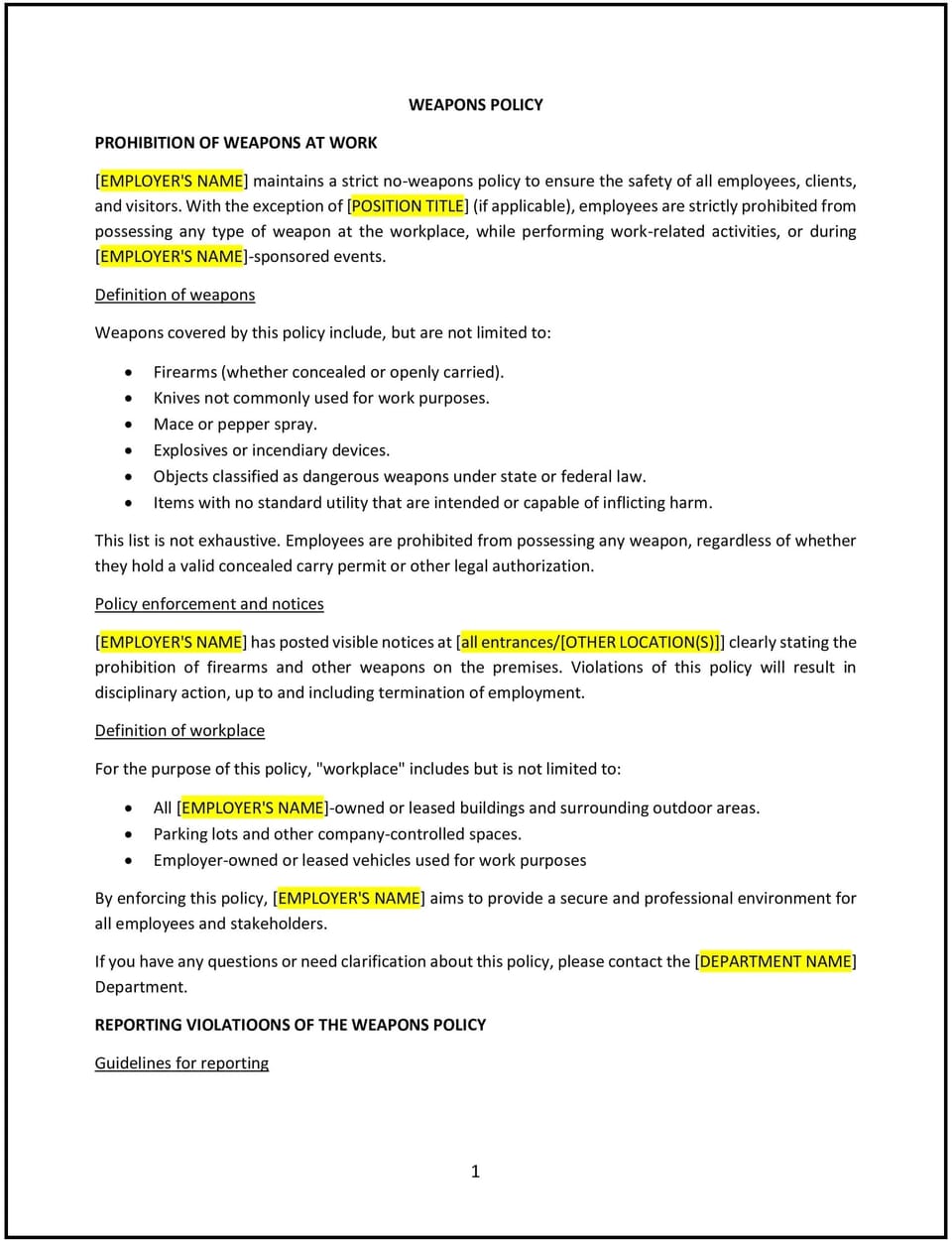Weapons policy (Alabama): Free template

Weapons policy (Alabama)
A weapons policy establishes clear guidelines regarding the possession, use, and storage of weapons in the workplace. For SMBs in Alabama, this policy helps ensure the safety of employees, customers, and visitors while complying with state and federal laws regarding weapons and workplace security.
This policy defines prohibited items, outlines exceptions (if applicable), and specifies the procedures for reporting and addressing violations.
How to use this weapons policy (Alabama)
- Define prohibited items: Clearly list weapons banned in the workplace, such as firearms, knives, explosives, or any other potentially dangerous objects.
- Address exceptions: Specify if any exceptions apply, such as lawful possession of firearms in private vehicles, as permitted by Alabama law.
- Establish reporting procedures: Provide a confidential process for employees to report suspected violations or concerns related to weapons.
- Include enforcement measures: Detail the consequences of violating this policy, ranging from warnings to termination, depending on the severity of the violation.
- Emphasize communication: Share the policy during onboarding and provide regular reminders to ensure employees understand and comply with the rules.
Benefits of using a weapons policy (Alabama)
A weapons policy helps SMBs foster a secure environment by setting clear expectations and protocols. Here’s how it helps:
- Enhances safety: Reduces the risk of workplace violence by prohibiting weapons on company premises.
- Supports compliance: Aligns with Alabama and federal laws regarding weapons in the workplace and on company property.
- Mitigates liability: Protects the company from legal risks by addressing weapons-related concerns proactively.
- Builds trust: Reassures employees and clients that their safety is a priority through transparent and enforceable policies.
- Promotes consistency: Ensures uniform enforcement of rules, reducing misunderstandings or disputes.
Tips for implementing a weapons policy (Alabama)
- Clarify vehicle exceptions: Include details about Alabama laws allowing lawful firearm possession in locked private vehicles on company property.
- Regularly communicate the policy: Ensure all employees are aware of the rules through onboarding, handbooks, and periodic training sessions.
- Monitor compliance: Conduct regular checks to confirm adherence to the policy, without infringing on employee privacy rights.
- Stay informed on laws: Keep the policy updated to reflect changes in Alabama and federal regulations related to weapons in the workplace.
- Foster a reporting culture: Encourage employees to report potential violations or concerns without fear of retaliation.
Q: What weapons should SMBs prohibit under this policy?
A: Prohibited items typically include firearms, knives (other than small utility tools), explosives, and any objects designed to cause harm.
Q: Are there exceptions for firearms under Alabama law?
A: Yes, Alabama law allows employees to store lawfully owned firearms in locked private vehicles on company property, provided they comply with state regulations.
Q: How can SMBs ensure employees understand this policy?
A: Communicate the policy during onboarding, include it in the employee handbook, and provide reminders during safety training sessions.
Q: What actions should SMBs take if a violation occurs?
A: Address violations immediately by removing the weapon, ensuring safety, and following disciplinary procedures outlined in the policy.
Q: Does this policy apply to visitors or contractors?
A: Yes, the policy should explicitly include visitors, vendors, and contractors to ensure workplace safety for all individuals on company property.
Q: How often should this policy be reviewed?
A: Review the policy annually or when changes to Alabama or federal weapons laws occur to ensure continued compliance and effectiveness.
This article contains general legal information and does not contain legal advice. Cobrief is not a law firm or a substitute for an attorney or law firm. The law is complex and changes often. For legal advice, please ask a lawyer.


